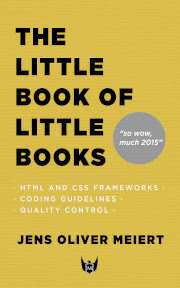Web Frameworks, Coding Guidelines, Quality Control, and the Craft of Web Development
Published on December 1, 2021 (↻ February 5, 2024), filed under Web Development (RSS feed for all categories).
What makes for the craft of web development? Defining this seems useful but also not trivial. I believe that being able to do things by yourself (without tooling) and consistently doing so at a high level are part of that definition.
What makes for craft when we look at HTML/CSS frameworks; at HTML/CSS coding guidelines; at website quality control? What do you think? From my end I’ve addressed this in former O’Reilly books on these topics. And it’s what this article recaps, lightly updated as O’Reilly released these titles back to me, allowing me to improve and re-publish them.
It follows, then, a view at the craft of web development related to frameworks, guidelines, and quality control, and as seen from 2015, 2016, and 2021:
HTML/CSS Frameworks
Professional web development is about quality. Quality is not easy to define, but one part of it is tailored code. External frameworks without customization options are impossible for users to tailor, and a pain for developers. Internal frameworks are much easier to handle and generally the way to go. Good frameworks aim for the highest quality—to be tailored, usable, and extensible. Framework users should follow the documentation and not overwrite framework code. Framework developers should have principles, a prototype, quality management tools, a maintenance plan, and healthy interest in documentation. And still, things can go wrong.
HTML/CSS Coding Guidelines
Coding guidelines govern how we write code.
Coding guidelines help consistency, and through that, indirectly, impact usability, collaboration, and maintainability.
Coding guidelines are important.
The main ingredients of a coding guideline are what (not) to do within a particular scope, examples, and an explanation.
Coding guidelines can target preference or quality.
Coding guidelines can be descriptive, prescriptive, or both.
Coding guidelines must be communicated, enforced, and reviewed.
And, there are some solid coding guidelines out there.
Website Quality Control
Quality management consists of quality planning, quality assurance, quality control, and quality improvement. It comes with a number of methods to identify (control), fix (improvement), and avoid defects (planning, assurance).
Website quality control includes the means to determine a) whether websites meet our own expectations and b) to what degree our websites meet professional best practices.
Quality control is important because otherwise we would have no way of knowing whether what we do and produce is any good. Quality control is professional; quality control saves time and money and sometimes nerves.
Quality control entails a great number of tests, covering security, accessibility, usability, performance, functionality, maintainability, semantics, validation, layout and design consistency, typography, (general) code quality, and coding standard compliance.
In practice, quality control requires training, depends on our mindsets, profits from automation, and needs enforcement.
And, finally, there are a gazillion tools for quality control and assurance.
Quality management is important, and no website should go without a plan for quality control.
❧ Our craft, reflected in frameworks, guidelines, and quality control. If you like this, or if you like to support my work improving the underlying books and therefore this perspective, check out The Little Book of Little Books on a platform of your choice—for example, at Amazon, Apple Books, Kobo, Google Play Books, Gumroad, or Leanpub.
About Me

I’m Jens, and I’m an engineering lead and author. I’ve worked as a technical lead for companies like Google and as an engineering manager for companies like Miro, I’m close to W3C and WHATWG, and I write and review books for O’Reilly and Frontend Dogma.
With my current move to Spain, I’m open to a new remote frontend leadership position. Feel free to review and refer my CV or LinkedIn profile.
I love trying things, not only in web development, but also in other areas like philosophy. Here on meiert.com I share some of my views and experiences.
Read More
Maybe of interest to you, too:
- Next: HTML Concepts: Form Owners
- Previous: The 6 Ways of Writing HTML (and Their Combinations)
- More under Web Development
- More from 2021
- Most popular posts
Looking for a way to comment? Comments have been disabled, unfortunately.

Get a good look at web development? Try WebGlossary.info—and The Web Development Glossary 3K (2023). With explanations and definitions for thousands of terms of web development, web design, and related fields, building on Wikipedia as well as MDN Web Docs. Available at Apple Books, Kobo, Google Play Books, and Leanpub.

